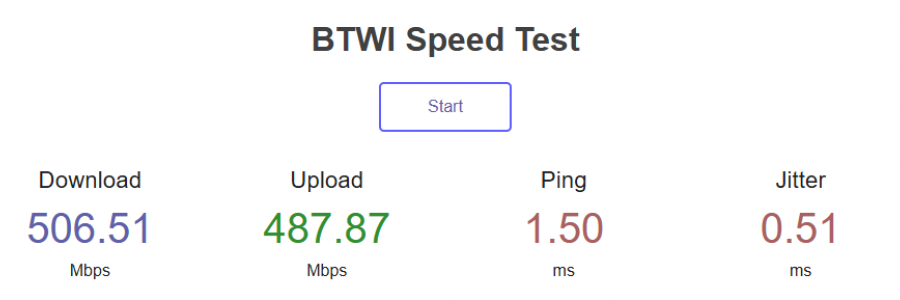How much internet speed do you really need?
Determining the amount of internet speed (bandwidth) you need can be confusing. Many ISP's (Internet Service Providers) make bold claims about how much speed you need. They'll likely say you need 1Gb (1 Gigabit) of speed to be happy. This simply isn't true, and is just a marketing ploy.
Speed is also just a single factor than can impact your internet experience. Here are some other factors to keep in mind.
- The number of devices you have connected.
- The number of people using the internet at the same time.
- The services you are connecting to.
- Wi-Fi interference or signal issues.
- The latency (ping) and jitter your connection has.
We will explore these later in this article.
The chart below gives a general idea of how much speed you need to do various tasks online. Download speeds listed here reflect the Standard/Platinum speed packages we have available.
| Download Speed | What Can You Do? |
|---|---|
| 10Mb | Email and basic web browsing. |
| 15Mb | All the above + audio streaming. |
| 20Mb | All the above + video streaming. |
| 30Mb | All the above + gaming. Up to 3 people online at once. |
| 50Mb | All the above + 4k video streaming. Home office. Up to 4 people online at once. |
| 75Mb | All the above + multiple 4k video streaming. Up to 6 people online at once. |
| 100Mb | All the above. 6+ people online at once. |
| 250Mb | All the above. 8+ people online at once. Large file sharing. |
| 500Mb | You've gone plaid! You can do it all... |
This chart is not a definitive guide, just a generalization. For instance, the 20M speed will work for someone who wants to game as long as they are the only internet user. They wouldn't necessarily need the 30Mb or 50Mb speed to game. Generally speaking, the more people or devices using the internet simultaneously, the more speed you need. You likely won't need a speed over 100Mb unless you do large file sharing. An example would be a photographer who works from home, but has to upload and download large photo or video files. Having a high speed allows them to do this more quickly.
As you can see from the above chart, most people will be just fine with a 50Mb (50 Megabit) download. This is more than enough bandwidth for multiple people to use the internet at the same time. From streaming, playing games, or working from home, 50Mb will do.
Your internet experience can be impacted by a number of factors. Lets explore some of these.
- Latency/Jitter
- Latency is a measure of time it takes you to communicate with an internet service (such as a website or game). Jitter is the measure of the variation of time it takes to communicate with a service.
- These are generally out of your control and are determined by your internet providers network structure. These will only impact certain activities while on the internet. Latency is usually important for gaming. Latency can also affect real time communications such as VOIP phone service or video conferencing. Jitter will also impact real time communications.
- The lower these numbers are, the better.
- Number of Users/Devices
- The more people using the internet, the more you will need. What they are using the internet for is equally important. You can have 10 people online and not need much speed if all they are doing is checking email and web browsing. However, this increases exponentially if all those people are doing video streaming individually.
- As more devices become connected to the internet, you might be surprised at how many devices you actually have connected. Appliances, lights, doors/locks, smart home devices (think Alexa), security cameras, and the list goes on. All these devices siphon off bits of your internet speed, some much more than others.
- Connected Service
- Sometimes the service you are connected to has an issue, or the path between you and that service. Your internet provider generally doesn't have any control over these. Once you exit your internet providers network and are on the internet at large, you are subject to any issues that may be in the path from your providers network and the service you wish to connect to. Its easy to determine if that is the issue by simply trying another service. If you can't reach amazon.com, but you can reach google.com, it could be amazon is having an issue.
- Wi-Fi
- Wi-Fi can be a main factor in a device getting poor speed. Wi-Fi is subject to interference, interior walls/structures blocking the signal, and distance to the device from the router providing the Wi-Fi. All these factors can make a device slow while online. An easy way to determine if it's a poor signal issue is to take the device near the router and see if it improves. If it does, it was receiving a poor signal where you were using it.
At BTWI, we will help you determine the speed you need. We won't try to oversell you on a higher priced speed package that doesn't fit your needs.
Don't just take our word for it about speed. The speed test site by Ookla has a good article about internet speed. Find it here: Speed Guide


